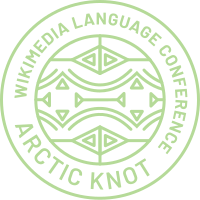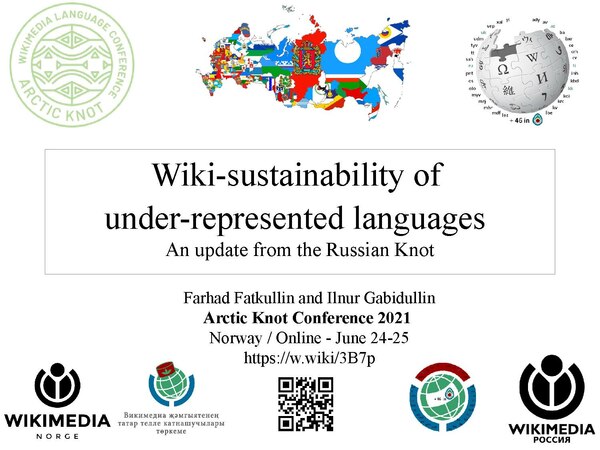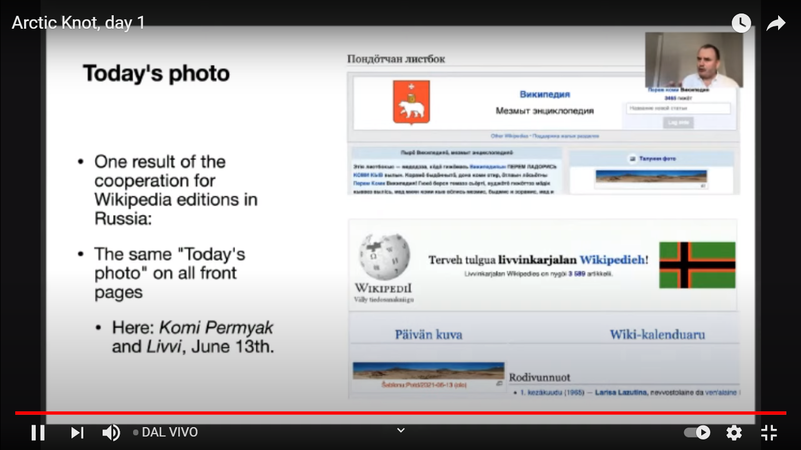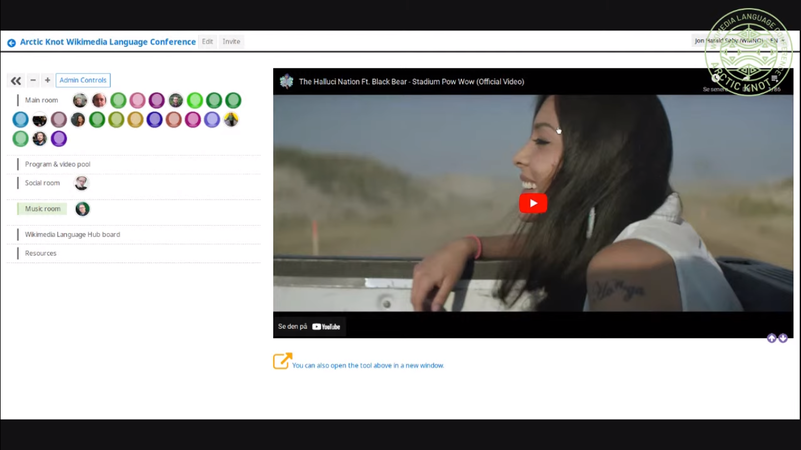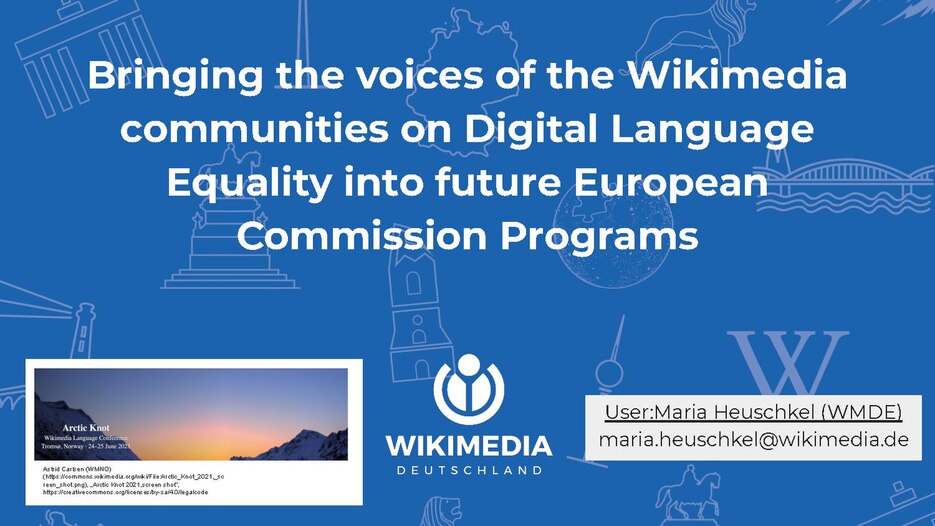From the Celts to the Arctic: Saami Parliamentarian and Norwegian Minister welcomed Wikimedia languages
3 июля 2021 года
| This article mentions Wikimedia Foundation, one of its projects or related people. Wikinews is one of Wikimedia Foundation projects. |
«Celtic Knot 2020» Wikimedia Language Conference this year passed the baton to the Nordic people, but will come back to the British Iles next. Participants welcomed funding creation of encyclopedic content in the languages of the indigenous peoples, as well as the European Commission initiative to assure full digital equality of all 24 Official and about 60 other local languages by 2030, as well as active participation in this work of various local stakeholders and Wikimedia affiliates.
Ceremonial welcomes on behalf of the organizers and representatives of Norway's political communities were well-balanced and didn’t take too long.
-
Welcome from the Wikimedia UK team — main organizers of the previous Wikimedia Language Conference
-
Head of the Wikimedia Norway welcomes participants on behalf of the Norwegian organizers
-
Welcoming address by the Sámi Parliament of Norway President Aili Keskitalo
-
Welcoming presentation by the Norwegian Minister for Education and Integration Guri Melby
Traditional thematic Telegram-chats this time were complemented by the Qiqochat platform that provided the offline conference type environment — visual interaction, relaxation/social room with a set of indigenous people’s music, sections with the event program and various links, and other probably useful functions. Live program was organized in one stream with everything available also on YouTube-channel, which was easily accessible old-style from the event’s Meta-Wiki page. The conference was running in the global citizens' language (English), so there were few Russian-speaking participants in online discussions and chats in general, and representatives of the Indigenous Languages of Russia in particular.
-
Qiqochat participant screen
-
Languages spoken by previously registered participants
However Russia itself, importance of Russian language, as well as contribution of Russia’s citizens towards preservation of the languages of the Arctic and Circumpolar Region was well visible:
- Professor of general linguistics Michael Rießler from the University of Eastern Finland noted the importance of the Indigenous People’s participation in the cross-language collaboration and their using opportunities offered by Wikipedia in the dominant languages, demonstrating this with the example of the Russian Wikipedia,
- co-organizer from the Arctic University of Norway Linnea Nordström proudly spoke about their partnership in this direction with colleagues from Russia, and she was followed by
- a plenary presentation of Russia representative in the UN Permanent Forum on Indigenous issues and a member of the Global Task Force for International Decade of Indigenous Languages Alexey Tsykarev.
Russian-speaking Wikimedians were represented
- in the Main Program by Amir Aharoni from Israel, who organized and conducted Day 2 Section on Interface translation,
- in the Video Pool by report of Farhad Fatkullin and Ilnur Gabidullin about the most notable milestones in Wikimedia Community Languages of Russia over the past year, as well as the new approaches developed by the Wikimedia Community of Tatar language User Group.
-
Multilingualism is a resource. Russian Wikipedia is likely more important for the minoritized peoples of Russia than even projects in their native languages.
-
Partners in the Arctic languages mapping and revitalization initiative
-
Presenting UN Decade of Action for Indigenous people's languages
-
Tatar community slides & video, as well as original application structure.
Key analytical overview presentations on the topic of the conference were delivered by Professors Michael Rießler from the University of Eastern Finland and Trond Trosterud from the Arctic University of Norway. The first one analyzed reasons assuring sustainability of the languages of the Arctic, the second one presenting a statistical analysis of Wikipedias in these languages, showcasing best practices of supporting those and indirectly praising both Wikimedia Russia and Wikimedia Languages of Russia Community.
-
Michael Rießler: «It's not the number of speakers that cause languages to become endangered, but resource inequality with the politically dominant one in the region. It's mainly due to insufficient funding, social recognition and promotion of related identities."
-
Trond Trosterud, Professor of Sámi language technology, UiT The Arctic University of Norway: Mapping Wikipedias in the Arctic languages
-
2016 Finno-Ugric WikiSeminar of Wikimedia Russia as an example of minority languages receiving support from the national Wikimedia chapters.
-
Picture of the Day for your Wikipedia edition's Main Page project as an example how neighbors receive support from individual volunteers of Wikipedias in the languages of Russia.
In between presentations participants enjoyed slow-motion videos of raindeers in winter Norway, listened to indigenous music, interacted with one another, experimented with presented tools, watched presentations from the Video Pool or kept themselves busy offline.
-
Awaiting the «What role can indigenous language Wikipedia versions play in the strengthening of literacy for the circumpolar indigenous languages?» Panel debate
-
First music video in the selection.
-
Lingua Libre: A convenient environment for recording words and phrases in different languages, saving them into the Wikimedia Commons and integration into the Wikidata. (from the report by Adélaïde Calais of Wikimedia France)
Key sessions of the second half of the first day were
- Panel debate: «What role can indigenous language Wikipedia versions play in the strengthening of literacy for the circumpolar indigenous languages?», in the course of which the general idea that «it’s important to assure direct funding of Wiki-content creation in the indigenous languages» was born and expressed,
- Keynote by the Wikidata founder Dr. Denny Vrandečić on the recently approved new projects WikiFunctions and Abstract Wikipedia, and the importance of effectively using existing human resources for assuring language preservation, as well as
- the cultural program «Radio cinema: A picture can cause changes», in the course of which conference participants were submerged into the Archive materials backed story of Indigenous peoples' lives in the mid-20th century Norway.
-
Denny Vrandečić: Why we need Abstract Wikipedia?
-
Because otherwise the idea of multilingualism will go bankrupt very soon...
-
Eva Maria Fjellheim: This «interest in talking about my roots» started with the photo of my granny dating back to 1920s...
-
Voice of the interviewed woman: «In 1948 this was still happening in all schools around Norway. I still remember how after measuring the size of my head the person said: «This one has weak intelligence"».
-
Panel debate participants: Leonore Lukschy (Endangered Languages Archive, School of Oriental and African Studies, University of London),Hanna Outakoski (Department of Language Studies, Umeå University, Sweden), Jon Harald Søby (Wikimedia Norway, member of the Wikimedia Foundation Language Committee) and Trond Trosterud (UiT The Arctic University of Norway). Moderated by Andrea Antoniou (School of Languages and Cultures, The University of Sheffield)
Day 2 Program was no less intensive, but it’s particularly important to mention presentations by:
- Wikimedia Germany representative on their participation in a wider European initiative to achieve full digital equality of all 24 Official languages of the European Union and some 60 other local languages by 2030, worked on as a part of the UNESCO announced Decade of Action for Indigenous languages (2022—2032) .
- Wikimedia UK representative responsible for supporting the community developing Scots Wikipedia and a discussion with the representative of the upcoming Dagbani Wikipedia
- Welsh Language Technology Specialist of the Welsh Government about why Wikipedia is important for them
- Wikimedia Canada on their work with Atikamek indigenous nation and the continuing support in developing Wikipedia in the eponymous language
All images, presentation slides and separate videos are collected in the conference category at the Wikimedia Commons, with Day 1 and Day 2 recordings being available in full on YouTube. Main Program and Video Pool pages, as well as separate presentations of great practical value for representatives of various Wikipedias in the languages of Russia are planned for interpretation into Russian.
Sources
править
Comments

If you would like to inform about a problem in the article (such as factual mistake etc.), please use regular talk page.
Comments on this page don't have to comply with Neutral Point of View policy, but please adhere to the topic and try to avoid raising the voice, making offensive or inciting comments. Try to formulate your comments in a way that would invite people to think, would be seen as either deeply observant or provoking additional clarification. Civil discussion and polite dispute turn comments page into a friendly space. Please give it a thought.
A few comments on how to comment:
- Please start new threads under the existing ones.
- Start new topic by putting a star symbol «*» in the beginning of the line. Then write your text.
- To respond, start a line beginning with one star more than in the line you are responding to.
- Please sign your messages using 4 swing dashes (~~~~). When previewing and saving your edit, they will be automatically replaced by you username and a date.
Please note that comments are not meant for placing external links unrelated to article topic - these can be removed or hidden by any participant. However, feel free to use comments page to give mass media articles linking to this post, as well as anything related to discussing it on other internet resources.
